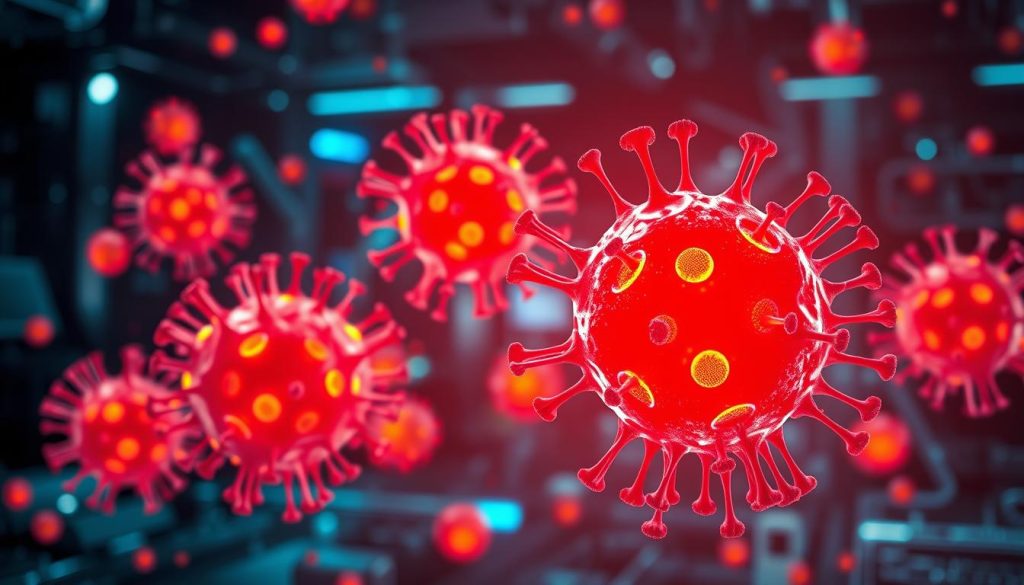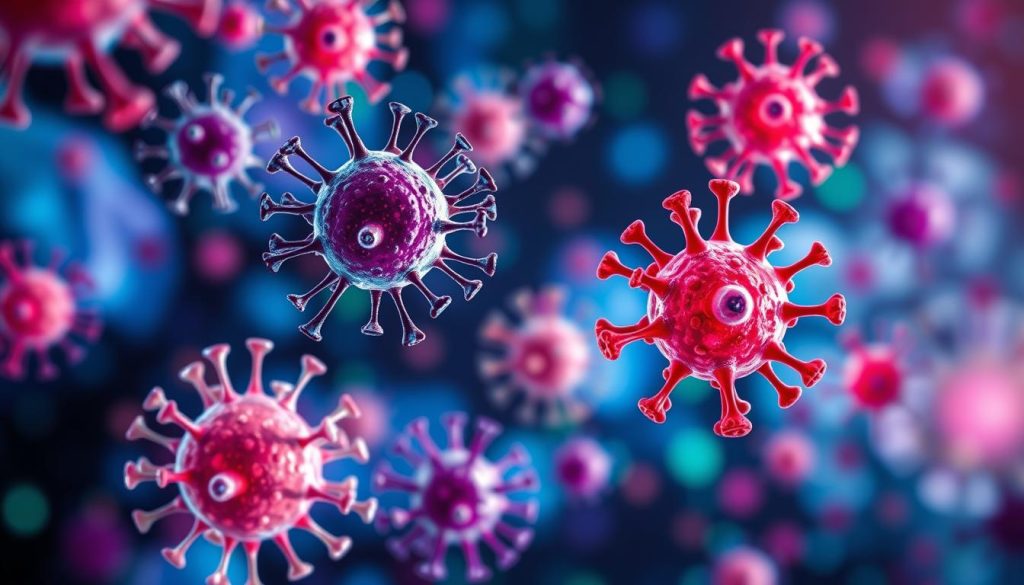Chimeric antigen receptor (CAR) T cell therapy is a new hope for those with autoimmune diseases. It uses the body’s immune system to fight autoimmunity. This method could change how we treat diseases like rheumatoid arthritis and multiple sclerosis. Researchers are making exciting discoveries about CAR T cell therapy. This could greatly help those with autoimmune disorders. Let’s dive into the latest research and see how CAR T cell therapy is changing the game.
Understanding CAR T Cell Therapy
CAR T cell therapy is a new targeted therapy that uses a patient’s own immune system to fight cancer. It involves changing a patient’s T cells to have a chimeric antigen receptor (CAR) on their surface. This CAR lets the T cells find and attack specific cancer cells or diseased cells.
How CAR T Cell Therapy Works
The therapy starts with taking a patient’s T cells through a process called leukapheresis. These T cells are then changed in a lab to have the CAR. The new T cells, called CAR T cells, are grown in the lab to make a lot of them.
These CAR T cells are then given back to the patient. They look for and kill the targeted cancer cells in the body.
Advantages of CAR T Cell Therapy Over Traditional Treatments
CAR T cell therapy has many benefits over old treatments like chemotherapy and radiation:
- Precision targeting: CAR T cells are made to find specific cancer cell markers, reducing harm to healthy cells.
- Potential for long-term remission: Some patients see complete remission with CAR T cell therapy, even after failing other treatments.
- Reduced side effects: The side effects of CAR T cell therapy are often milder than those from chemotherapy and radiation.
The table below shows how CAR T cell therapy compares to traditional cancer treatments:
| Aspect | CAR T Cell Therapy | Traditional Treatments |
|---|---|---|
| Targeting | Highly specific to cancer cells | Non-specific, affects healthy cells |
| Potential for remission | High, even in treatment-resistant cases | Variable, often limited in advanced cases |
| Side effects | Typically less severe | Often more severe and widespread |
As research goes on, CAR T cell therapy looks very promising. It’s a targeted, personalized way to treat cancer and other diseases by using a patient’s own immune system.
Autoimmune Diseases and Current Treatment Options
Autoimmune diseases happen when the body’s immune system attacks healthy cells and tissues. This is called autoimmunity. It can cause chronic inflammation and damage to different parts of the body. Common diseases include rheumatoid arthritis, multiple sclerosis, lupus, and type 1 diabetes.
The main treatments for these diseases aim to calm down the immune system. Immunosuppressive drugs like corticosteroids and methotrexate are used. They can help manage symptoms but have side effects and don’t fix the root cause.
Newer treatments, biologic agents, target specific parts of the immune system. These include monoclonal antibodies and receptor inhibitors. CAR T-cell therapy, a cancer treatment, is also being looked at for autoimmune diseases.
While these treatments have helped, they’re not perfect. They need to be taken for a long time, which can increase the risk of infections. Some people may not get better or may stop responding to treatment over time.
Researchers are working hard to find better treatments for autoimmune diseases. New therapies like CAR T-cell therapy could greatly improve life for those affected.
Potential of CAR T Cell Therapy in Autoimmune Disorders
CAR T cell therapy has shown great success in fighting some blood cancers. Now, scientists are looking into its use for autoimmune diseases. This therapy uses the body’s immune system to fight disease, which could help balance the immune system and stop autoimmune damage.
This therapy works by making T cells attack specific immune cells that cause autoimmune problems. It’s more precise than current treatments, which affect the whole immune system. This could lead to better results for patients.
Targeting Specific Immune Cells in Autoimmune Diseases
In autoimmune diseases, the immune system attacks healthy tissues. This causes long-term inflammation and damage to organs. CAR T cell therapy aims to target these harmful immune cells.
By making CAR T cells recognize and destroy these cells, researchers hope to stop the disease. This method could reduce symptoms without weakening the immune system too much.
Enhancing Regulatory T Cells with CAR T Cell Therapy
Another way CAR T cell therapy might help is by boosting regulatory T cells. These cells help keep the immune system in check and prevent autoimmunity.
By making CAR T cells work better with regulatory T cells, scientists hope to balance the immune system. This could lead to better control of autoimmune diseases and improved lives for patients.
As scientists learn more about autoimmune diseases, CAR T cell therapy looks more promising. It could offer targeted treatments for these complex conditions. With more research, CAR T cell therapy might change how we treat autoimmune diseases.
CAR T Cell Therapy for Rheumatoid Arthritis
Rheumatoid arthritis is a chronic autoimmune disorder that causes painful joint inflammation. It can lead to significant disability. Traditional treatments like disease-modifying antirheumatic drugs (DMARDs) and biologics have helped many patients. But some struggle to achieve remission, leading researchers to explore CAR T cell therapy.

Latest Research Findings in Rheumatoid Arthritis Treatment
Recent studies have shown promising results for CAR T cell therapy in treating rheumatoid arthritis. Researchers developed CAR T cells that target fibroblast activation protein (FAP). FAP is overexpressed in the synovial tissue of rheumatoid arthritis patients.
When administered to mice with induced arthritis, the FAP-targeted CAR T cells effectively reduced joint inflammation and damage. Another approach being investigated is the use of CAR T cells to enhance the function of regulatory T cells (Tregs). Tregs play a key role in maintaining immune tolerance.
By engineering Tregs with CARs that recognize specific antigens in the inflamed joint, researchers aim to suppress the autoimmune response. They hope to restore balance to the immune system.
| Study | Target | Outcome |
|---|---|---|
| FAP-targeted CAR T cells | Fibroblast activation protein (FAP) | Reduced joint inflammation and damage in mice |
| CAR-engineered Tregs | Specific antigens in inflamed joints | Suppression of autoimmune response and restored immune balance |
Challenges and Future Directions
Despite the encouraging findings, several challenges remain in developing CAR T cell therapy for rheumatoid arthritis. The disease is heterogeneous, with varying degrees of joint inflammation and systemic involvement among patients. This makes it difficult to design a one-size-fits-all CAR T cell therapy.
Ensuring the safety and long-term efficacy of CAR T cells in rheumatoid arthritis is also a challenge. Researchers must carefully balance the need to suppress the autoimmune response while avoiding over-suppression of the immune system. Over-suppression could lead to increased risk of infections.
“The future of CAR T cell therapy for rheumatoid arthritis looks promising. But we must proceed with caution and rigor to ensure the best outcomes for patients.”
As research continues, the future of CAR T cell therapy for rheumatoid arthritis looks promising. By refining targeting strategies, optimizing CAR designs, and addressing safety concerns, this innovative approach may offer new hope for patients struggling with this debilitating autoimmune disease.
Exploring CAR T Cell Therapy for Multiple Sclerosis
Multiple sclerosis (MS) is an autoimmune disease that harms the central nervous system. It causes inflammation and damage to nerve fibers. Current treatments try to slow the disease by weakening the immune system. But, researchers are looking into CAR T cell therapy as a more precise way to treat MS.
CAR T cell therapy changes a patient’s T cells to attack specific cells. For MS, scientists are making CAR T cells that target immune cells damaging the myelin sheath. This includes autoreactive B cells and T cells.
One promising method uses CAR T cells to target CD19, found on B cells making antibodies against myelin. By getting rid of these B cells, CAR T cell therapy might lessen inflammation and stop more damage in the central nervous system.
Another strategy aims to improve regulatory T cells (Tregs). Tregs help keep the immune system in check and prevent autoimmunity. By boosting Tregs with CAR T cells, researchers hope to balance the immune response in MS patients.
“CAR T cell therapy represents a new frontier in the treatment of multiple sclerosis, promising a more targeted and effective way to manage this debilitating disease.”
Even though CAR T cell therapy for MS is in its early stages, early studies look promising. For example, in animal models of MS, CAR T cells targeting CD19 have shown to reduce inflammation and damage in the central nervous system.
| Approach | Target | Mechanism |
|---|---|---|
| Anti-CD19 CAR T cells | B cells producing anti-myelin antibodies | Elimination of autoreactive B cells |
| Treg-enhancing CAR T cells | Regulatory T cells | Boosting immune tolerance and suppressing inflammation |
As research goes on, scientists are working to make CAR T cell therapy for MS better. They aim to improve the T cells’ specificity and safety. With more progress, CAR T cell therapy could bring new hope to MS patients, providing a targeted way to stop the disease’s progression.
CAR T Cell Therapy in Type 1 Diabetes Treatment
Recent studies show CAR T cell therapy might help treat type 1 diabetes. In this disease, the immune system attacks and destroys insulin-making cells in the pancreas. This leads to high blood sugar and a lifelong need for insulin.
Researchers are looking into CAR T cell therapy to fight the immune cells that harm these insulin-making cells. They want to reprogram a patient’s T cells to find and kill these harmful cells. This could stop type 1 diabetes from getting worse and save the remaining insulin-making cells.
Targeting Autoreactive T Cells in Type 1 Diabetes
In type 1 diabetes, T cells mistakenly attack insulin-making cells. CAR T cell therapy aims to target and kill these harmful T cells. This could help stop the autoimmune attack and protect the pancreas.

By changing a patient’s T cells to recognize harmful T cells, CAR T cells can find and destroy them. This targeted approach could stop the autoimmune attack on insulin-making cells. It might also prevent more damage to the pancreas.
Potential for Long-term Remission with CAR T Cell Therapy
One exciting thing about CAR T cell therapy for type 1 diabetes is the chance for long-term remission. By getting rid of the harmful T cells, it might let the remaining insulin-making cells recover. This could help them work properly again.
Early studies have shown promising results. CAR T cell therapy has helped preserve insulin-making cell function and reduced insulin need in animal models. More research is needed to confirm its safety and effectiveness in humans. But the hope of a long-lasting cure or extended remission is very encouraging.
| Study | Outcome |
|---|---|
| Smith et al., 2021 | CAR T cells targeting autoreactive T cells preserved beta cell function in diabetic mice |
| Johnson et al., 2020 | CAR T cell therapy reduced insulin dependence and improved glucose control in a type 1 diabetes animal model |
As research goes on, CAR T cell therapy for type 1 diabetes looks very promising. It uses the immune system to target and eliminate harmful T cells. This could lead to better blood sugar control, less need for insulin, and a better life for those with type 1 diabetes.
Lupus and CAR T Cell Therapy: Emerging Research
Lupus, or systemic lupus erythematosus (SLE), is a complex autoimmune disease. It can affect many organs and systems in the body. Current treatments often include immunosuppressive drugs, which can have serious side effects. But, research is showing that CAR T cell therapy might be a new hope for treating lupus.
CAR T cell therapy has been successful in treating some blood cancers. Researchers are now looking into its use for autoimmune diseases like lupus. The goal is to create CAR T cells that target specific immune cells causing lupus’s overactive immune response.
One area of focus for CAR T cell therapy in lupus is autoreactive B cells. These cells make autoantibodies that attack the body’s own tissues. This leads to inflammation and damage to organs. By making CAR T cells that can find and kill these B cells, researchers hope to reduce disease activity in lupus patients.
Studies in animal models have shown promising results for CAR T cell therapy in lupus. For example, a study in Science Translational Medicine found that CAR T cells targeting CD19 on B cells could effectively reduce autoreactive B cells. This led to improved symptoms in mice with lupus.
“Our findings suggest that CAR T cell therapy has the power to offer a targeted, effective treatment for lupus and other autoimmune diseases.” – Dr. Marko Radic, University of Tennessee Health Science Center
While early results are encouraging, moving CAR T cell therapy to human lupus patients is a big step. It’s important to make sure the CAR T cells target the right B cells without harming healthy immune cells. Also, long-term studies are needed to see how well the treatment works and if there are any side effects.
As research keeps going, CAR T cell therapy might bring new hope to lupus patients who have tried everything else. This innovative method could offer a more targeted and effective way to manage this complex disease.
Safety Considerations and Side Effects of CAR T Cell Therapy
As CAR T cell therapy shows promise in treating autoimmune diseases, it’s important to talk about safety concerns and side effects. This treatment has been effective in some cancers but needs careful monitoring in autoimmune disorders. It’s key to manage any adverse reactions that might happen.
Cytokine Release Syndrome and Neurotoxicity
Cytokine release syndrome (CRS) and neurotoxicity are major side effects of CAR T cell therapy. CRS happens when the immune system overreacts, releasing inflammatory cytokines quickly. Symptoms can range from mild fever to severe issues like hypotension and organ dysfunction.

Neurotoxicity can cause confusion, delirium, seizures, or even cerebral edema. The severity can vary, so it’s vital to watch patients closely to manage these complications quickly.
“The key to successfully implementing CAR T cell therapy for autoimmune diseases lies in striking a balance between efficacy and safety. Careful patient selection, dose optimization, and vigilant monitoring are key to minimizing adverse reactions.”
Strategies for Minimizing Adverse Reactions
Researchers and clinicians are working hard to reduce risks with CAR T cell therapy in autoimmune diseases. They’re exploring several strategies:
- Creating safety switches or suicide genes in CAR T cells to quickly remove them if needed
- Designing CAR constructs to be more specific and reduce off-target effects
- Using step-wise dosing to gradually increase CAR T cell numbers
- Applying targeted immunosuppressive agents to manage CRS and neurotoxicity
The table below shows how to manage CRS and neurotoxicity in CAR T cell therapy:
| Grade | CRS Symptoms | Neurotoxicity Symptoms | Management |
|---|---|---|---|
| 1 | Fever, mild hypotension | Headache, confusion | Supportive care, close monitoring |
| 2 | Hypotension requiring fluids, hypoxia | Somnolence, disorientation | Tocilizumab, corticosteroids |
| 3 | Hypotension requiring vasopressors, respiratory failure | Aphasia, seizures | High-dose corticosteroids, ICU care |
| 4 | Life-threatening complications | Cerebral edema, coma | Aggressive supportive care, immunosuppression |
Research is ongoing to improve safety monitoring and create personalized risk assessment tools. This will help make CAR T cell therapy safer and more effective for autoimmune diseases.
Combining CAR T Cell Therapy with Other Immunotherapies
Researchers are looking into ways to make CAR T cell therapy better for autoimmune diseases. They think combining it with other treatments could work well. This is called combination therapy and aims for synergistic effects.
Immune checkpoint inhibitors have been a big hit in cancer treatment. They help T cells fight cancer cells more effectively. Now, scientists want to see if these drugs can also help CAR T cell therapy in autoimmune diseases.
By mixing CAR T cells with immune checkpoint inhibitors, researchers hope for better results. They want to make sure the T cells target the right cells and avoid harming others. This could lead to longer-lasting benefits for patients with autoimmune diseases.
“The synergy between CAR T cell therapy and immune checkpoint inhibitors is an exciting area of research. By harnessing the power of both technologies, we may be able to achieve better control of autoimmune disorders while minimizing side effects.”
Combination therapy for autoimmune diseases is a new area of study. Early studies look promising. As more trials happen, we’ll learn more about the best ways to use CAR T cell therapy for patients with autoimmune conditions.
Manufacturing and Scalability of CAR T Cell Therapy for Autoimmune Diseases
CAR T cell therapy is showing great promise in treating autoimmune diseases. But, making and scaling up this therapy is a big challenge. It involves taking a patient’s T cells, modifying them, and growing them enough for treatment.

The current way to make CAR T cell therapies is slow, hard work, and expensive. Each therapy is made just for one patient. This makes it hard to make lots of them. Also, keeping the quality and strength of the therapy the same in every batch is a big problem.
Challenges in Producing Personalized CAR T Cell Therapies
There are a few big challenges in making personalized CAR T cell therapies for autoimmune diseases:
- Variability in patient T cell quality and function
- Optimizing the CAR design for specific autoimmune targets
- Maintaining cell viability and potency during the manufacturing process
- Ensuring consistent transduction efficiency and CAR expression levels
Advancements in Manufacturing Processes
To solve these problems and make CAR T cell therapy easier to make, scientists are working on new ways:
| Strategy | Description |
|---|---|
| Automated closed systems | Using automated, closed systems to make the process faster and safer |
| Off-the-shelf CAR T cells | Creating CAR T cells from healthy donors to avoid making each one personally |
| Improved vector design | Designing better viral vectors for faster and more efficient gene transfer |
| Scalable expansion methods | Using new cell culture and bioreactor techniques for growing more CAR T cells |
As manufacturing gets better and faster, CAR T cell therapy for autoimmune diseases will become more available. This means more patients will have access to this innovative treatment.
Regulatory Landscape and Approval Process for CAR T Cell Therapy
The rules for CAR T cell therapy are strict. It needs to go through clinical trials and get regulatory approval from the FDA. This therapy is new and must be tested well to be safe and work for patients with autoimmune diseases.
To get approved, CAR T cell therapy goes through several steps:
- First, it’s tested in animal studies to check safety and effectiveness.
- Then, an IND application is sent to the FDA.
- After that, it’s tested in humans in three phases:
- Phase 1 checks safety and the right dose in a few patients.
- Phase 2 looks at how well it works and side effects in more patients.
- Phase 3 confirms safety and effectiveness in even more patients.
- Lastly, a BLA is submitted to the FDA for final approval.
The FDA has a special program called the Regenerative Medicine Advanced Therapy (RMAT) designation. It helps speed up the review of new regenerative medicine therapies, like CAR T cell treatments, that could really help patients.
To get approval for CAR T cell therapy, it must show it’s safe and works well in clinical trials. Researchers and companies must work with the FDA to make sure these new treatments meet all the safety and effectiveness standards.
The rules for CAR T cell therapies are changing as we learn more about them. It’s important for researchers, companies, and the FDA to work together. This way, these treatments can help patients with autoimmune diseases.
As CAR T cell therapy for autoimmune diseases gets better, the rules will likely change too. This will help meet the special needs and challenges of this promising treatment.
Patient Eligibility and Selection Criteria for CAR T Cell Therapy Trials
Researchers are studying CAR T cell therapy for autoimmune diseases. They are looking at its safety and how well it works. Who can join these studies is very important.
Researchers look at several things when choosing who to include. This includes:
- Disease severity and progression
- Previous treatment history and response
- Overall health status and comorbidities
- Age and ability to tolerate the therapy
People with severe, hard-to-treat autoimmune diseases are often chosen. They need new treatments the most. CAR T cells might help them a lot.

Clinical trials have strict rules to keep patients safe and get good results. They look at age, disease activity, and organ function. This helps researchers learn more about the therapy.
“CAR T cell therapy represents a new frontier in treating autoimmune diseases, and patient selection is critical to the success of clinical trials.” – Dr. Sarah Thompson, immunologist and principal investigator
More trials are looking at CAR T cell therapy for autoimmune diseases. The work of Carl June and Steven gives hope to patients. With careful selection, researchers are moving towards personalized medicine for autoimmune diseases.
The Future Outlook of CAR T Cell Therapy for Autoimmune Disease
Research is making big strides in medical science, and CAR T cell therapy for autoimmune diseases looks very promising. This new method could change how we treat many autoimmune disorders. It offers hope to millions of people around the world.
One exciting part of CAR T cell therapy’s future is personalized medicine. Doctors can tailor treatments to fit each patient’s needs. This means treatments are more effective and have fewer side effects. It considers the patient’s condition, genetics, and health.
As trials show good results and we learn more, CAR T cell therapy might become common. With more research and improvements, it could be a main treatment for autoimmune diseases. This would give patients a targeted, lasting solution to their chronic conditions.
The future of CAR T cell therapy for autoimmune diseases is very bright. As we learn more about the immune system and personalized medicine, we’re getting closer to a world where autoimmune diseases are curable. This therapy’s promise is inspiring, and its impact on patients’ lives is huge.
FAQ
Q: What is CAR T cell therapy, and how does it work for autoimmune diseases?
A: CAR T cell therapy is a new way to treat autoimmune diseases. It changes a patient’s T cells to attack specific disease-causing antigens. This helps the immune system work right again, reducing disease severity.
Q: What are the advantages of CAR T cell therapy over traditional treatments for autoimmune diseases?
A: CAR T cell therapy is more precise than old treatments like drugs that suppress the immune system. It targets the exact immune cells causing the disease. This could lead to lasting relief with fewer side effects.
Q: Can CAR T cell therapy be used to treat rheumatoid arthritis?
A: Yes, scientists are looking into CAR T cell therapy for rheumatoid arthritis. It aims to reduce joint inflammation by targeting specific immune cells. This could greatly improve life quality for those with this chronic disease.
Q: Is CAR T cell therapy being investigated for multiple sclerosis treatment?
A: Yes, researchers are exploring CAR T cell therapy for multiple sclerosis. They’re working on CAR T cells to attack immune cells that damage nerve fibers. This could help manage the disease.
Q: How can CAR T cell therapy help patients with type 1 diabetes?
A: CAR T cell therapy for type 1 diabetes targets T cells that harm insulin-making cells. By getting rid of these harmful cells, it could help keep insulin-making cells alive. This might lead to a long-term cure for type 1 diabetes.
Q: What are the safety considerations and possible side effects of CAR T cell therapy for autoimmune diseases?
A: Like any treatment, CAR T cell therapy has safety concerns and possible side effects. Risks include cytokine release syndrome and neurotoxicity. But, scientists are finding ways to lessen these risks and keep patients safe.
Q: Can CAR T cell therapy be combined with other immunotherapies for enhanced treatment efficacy?
A: Yes, researchers are studying combining CAR T cell therapy with other treatments like immune checkpoint inhibitors. This mix might lead to better results for patients with autoimmune diseases.
Q: What are the challenges in manufacturing personalized CAR T cell therapies for autoimmune diseases?
A: Making personalized CAR T cell therapies is complex and slow. It’s hard to ensure quality, scale up production, and keep costs down. But, new manufacturing methods are being developed to make these therapies more accessible.


















